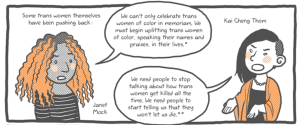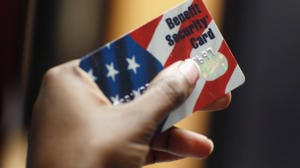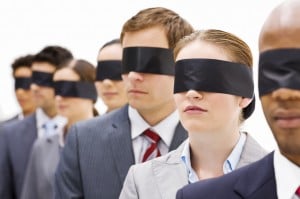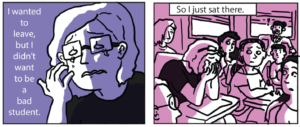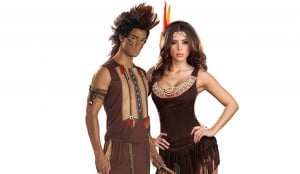Originally published on AlterNet and republished here with the author’s permission.

A person sits alone with popcorn, tilting their head and pointing a remote control at a television.
(CN: Sexual violence)
“Well, sure, he raped her. But it’s not a big deal. Rape, shmape. All friendships and relationships have their ups and downs. They can still be friends, or get married. Heck, maybe the rape could be the start of a beautiful love story.”
Does this sound like an absurdist attempt at ghoulish humor? It’s not. This trope is all over pop culture – and has been for decades.
In some stories, rapes happen while characters are friends, lovers, or married, and the relationship goes on as if little or nothing happened. In others, rapes are the beginning of a happy relationship.
Here are ten characters in pop culture who voluntarily stayed friends, lovers, colleagues, or spouses with the people who raped or tried to rape them.
1. Laura Webber, General Hospital
For a time in the ’70s and ’80s, Luke and Laura were America’s sweethearts. They made General Hospital a crossover hit, and their wedding episode drew millions of viewers from outside the daytime TV crowd.
Their relationship began with Luke raping Laura. Because Luke and Laura were so popular, the writers tried to pretend this didn’t happen, but the retcon didn’t stick. The rape was then acknowledged, making the story a classic example of rape trivialization.
Luke raped Laura; she fell in love with him; they became daytime TV’s most famous supercouple. They got married and had kids. They stayed married for decades. There were stories about them as a couple as recently as 2013.
2. Homer Simpson, The Simpsons
“What on Earth?” you may be thinking. “When was Homer Simpson raped? Why wasn’t it major entertainment news?”
That’s exactly the question on the table. In “Every Man’s Dream,” the 2015 season premiere where Marge and Homer consider divorce, Homer takes up with a young pharmacist named Candace. She doses his drink with roofies. They wake up in bed together. It’s clear that she raped him. Then they start dating.
No, it’s not called rape. The Simpsons Wikia describes it thusly: “Candace takes Homer on a date and dopes him, which leads Homer to make the one drunken mistake he never made: sleep with someone other than Marge.”
But people don’t make mistakes when they’ve been drugged into unconsciousness. Drugging people to have sex with their non-consenting bodies is rape.
It’s true that at the end of the episode, it’s revealed that this was all a dream. So what? When the story is unfolding, we don’t know that. And the rape isn’t presented as a horror, or even as rape. It’s a joke. What woman would want to have sex with Homer so badly that she’d drug him? Har de har har.
This is especially disturbing when you look at how male rape victims are dismissed; it’s assumed that all men want all the sex all the time, so men being raped is seen as inherently absurd.
3. Billy the Poet’s Army of Women, Welcome to the Monkey House
In the title story of the collection by Kurt Vonnegut, a sexually repressive society brainwashes its citizens and forces them to take genital-numbing drugs, and rebels fight back. The leader of the rebellion, Billy the Poet, kidnaps women, waits until the drugs have worn off, and initiates them into sex.
Now it’s Nancy’s turn. But he doesn’t ask for consent. His method of deprogramming women from anti-sex brainwashing is to rape them. Even the most ardent denialist would have to call this rape: Nancy says no, several times, and tells Billy the only way he’ll have sex with her is to hold a pistol to her head and have eight of his soldiers hold her down. To quote from the story: “Which he did.”
Vonnegut doesn’t call it rape, though. The story says Billy “deflowered” Nancy. Afterward, Billy explains he’s “attempting to restore a certain amount of innocent pleasure to the world” – her rage and defiance then disappear, and she sits quietly and bows her head.
It’s not a stretch to assume she’ll eventually join his army. Billy’s army is staffed with loyal female solders he liberated – that is, raped – and who are grateful for their rapes. They’re so supportive of his cause, they help him rape other women.
4. Janet Gavin, Rescue Me
In the “Sparks” episode in 2006, Tommy and Janet are divorcing when he finds she’s been seeing his brother. He’s furious, and in the middle of a conversation about their divorce, he throws her on the couch, pulls off her clothes, and while she’s fighting him off, he pins her down and rapes her.
It’s clear afterward that she enjoyed it, and they continue a tempestuous, on-again-off-again relationship.
There was significant outcry about this story, and in a classic example of rape denial, co-creator and star Denis Leary insisted that the scene was not a rape. “She goes from fear and anger,” he said, “and punching him in the face and fighting him back, and back to the place where they began their relationship, where the spark occurred.”
Newsflash, Mr. Leary. When someone is punching you and fighting back, and you have sex with them anyway, and they didn’t clearly say they changed their mind, and it wasn’t negotiated as consensual kink, it’s rape.
If a character says afterward that she enjoyed it, that doesn’t make it not rape. That makes the writers rape denialists.
5. Nola Darling, She’s Gotta Have It
In Spike Lee’s breakout 1986 film, Nola Darling has three boyfriends, a fact she’s open about. The boyfriends don’t like it, though, and one of them, Jamie, comes to her apartment and rapes her.
She then stops dating the other two men and pursues a monogamous relationship with her rapist.
(To his credit, Lee later expressed strong remorse over this, calling it “my biggest regret.”)
6. Scarlett O’Hara Butler, Gone with the Wind
This is one of the most classic forms of the trope.
Rhett and Scarlett are married, and they’re having an ugly fight in which he threatens to kill her. She leaves the room (in the book, she runs); he catches up with her, grabs her, carries her up the stairs, and forces himself on her.
In the book, she screams and is “wild with fear,” and in the movie, she fights him off, but then becomes aroused, and the next morning she’s humming with delight, reveling in “the memory of rapture, of the ecstasy of surrender.”
(Earlier in the story, when she tells him she doesn’t want to have sex anymore and that she’ll lock her door every night, he replies, “Why bother? If I wanted you, no lock would keep me out.”)
This is a classic form of this trope, and the defense of it is one of the most common ways rape is denied. “She changed her mind! Can’t people change their minds?”
Sure, people can change their minds. When people say no to sex, they can later say yes. But “not fighting back anymore” isn’t saying yes. It’s important to get clear, unpressured consent to sex: it’s ten times more important when someone has said no.
The idea that women really want to be raped, and that not fighting back anymore equals consent, is one of the most common forms of rape denial. It’s how rapists justify their actions and avoid thinking of it as rape, and it’s how society trivializes rape and denies it exists.
No means no. No means no until it turns into an explicit yes. Having sex with people who’ve said no – whether with words, or by locking their bedroom door, running, screaming, and fighting – is rape.
If you’re uncomfortable with this because you think the scene is hot, remember that fantasies of non-consent are common. That’s fine. Just don’t pretend it’s not rape.
7. Stephanie Mangano, Saturday Night Fever
After Stephanie and Tony win the dance competition, he tries to rape her. The movie ends happily when they decide to be friends.
8. Quinn Fabray, Glee
Puck gets Quinn drunk and has sex with her. For the record, that’s rape. Later, she blames herself and calls the incident a “mistake.” Still later, they fall in love and have a relationship.
9. Louretta Hawkins, The Soul Brothers and Sister Lou
In this popular, award-winning 1968 teen novel, Phil Sattertwaite, also known as Fess, tries to get Louretta to join a black revolutionary group. When she refuses, he takes it as a personal rejection and tries to rape her. They stay friends and continue to work together, and he comes up with the name for her singing group.
10. Betty Childs, Revenge of the Nerds
Lewis Skolnick steals a Darth Vader mask from Betty’s boyfriend Stan, sneaks up on Betty, and rapes her.
She didn’t consent to have sex with him: she thought he was Stan. When he takes off the mask, she decides it’s okay: Sure, they had sex without her consent, but he was better at it than Stan, so she leaves her boyfriend for the nerd who raped her.
Honorable Mention: Joan Holloway, Mad Men
In the Season 2 episode “The Mountain King,” Joan’s fiancé, Greg Harris, visits her in her office. When he initiates sex and she says no, he forces her to the floor and rapes her. They go to dinner that night as planned, and she marries him as planned.
This mention is honorable because it uses this trope, not to trivialize rape, but to show its horror – and the horror of a life where a woman thinks her best option is marrying her rapist.
After he rapes her, Greg acts like everything is normal, but Joan is deeply upset, and leaves the bouquet of roses he brought her. She goes ahead with the marriage, but she never forgets.
In “Mystery Date” in Season 5, when they’re fighting just before their divorce, she says, “You’re not a good man, you never were, and you know what I’m talking about.”
This is one of the truest examples of this trope. Joan doesn’t stay with Greg because rape is no big deal, or because she actually liked it. She stays because her options are limited, and this is her least bad choice.
This is the truth for a lot of rape victims. They’re married to their rapists and depend on them for support; they work for their rapists and depend on them for their job; they work alongside their rapists and know that if they reveal the rape, they’ll be the ones marked as troublemakers; they’re in the same social circle as their rapists and know that if they reveal the rape, they’ll end up as the ones who are outcast.
Mad Men uses this storyline to expose rape and its realities. In the other stories, the trope serves to trivialize rape, treat it as normal, or deny it altogether.
***
There are hundreds of examples, possibly thousands. Buffy Summers, Buffy the Vampire Slayer. Daenerys Targaryen, Game of Thrones. Cersei Lannister, Game of Thrones. Nick Burkhardt, Grimm. Sally Jupiter, Watchmen. Elizabeth Lavenza, Young Frankenstein. Natalia Landauer, Cabaret. Annette, Saturday Night Fever. Lori Grimes, The Walking Dead. Pennsatucky, Orange Is the New Black.
Rape culture is often dismissed out of hand. Rape is against the law, rapists sometimes go to prison, and we think rape is bad, so the concept of rape culture is treated as ridiculous. But that’s a strawman definition.
Rape culture, according to one of the most widely cited definitions, is an environment in which rape is prevalent and in which sexual violence against women is normalized and excused in the media and popular culture.
And that’s exactly what this trope does. It normalizes rape, and excuses it. It’s disturbing to realize how ingrained it is, how casually audiences are asked to accept it, and how often it flies by without being noticed.
[do_widget id=’text-101′]
Greta Christina is author of The Way of the Heathen: Practicing Atheism in Everyday Life, of Comforting Thoughts About Death That Have Nothing to Do with God, of Coming Out Atheist: How to Do It, How to Help Each Other, and Why, of Why Are You Atheists So Angry? 99 Things that Piss Off the Godless, and of Bending: Dirty Kinky Stories About Pain, Power, Religion, Unicorns, & More. She blogs at Greta Christina’s Blog, at The Orbit, the atheist social justice blogging site.
Search our 3000+ articles!
Read our articles about:
Our online racial justice training
Used by hundreds of universities, non-profits, and businesses.
Click to learn more






